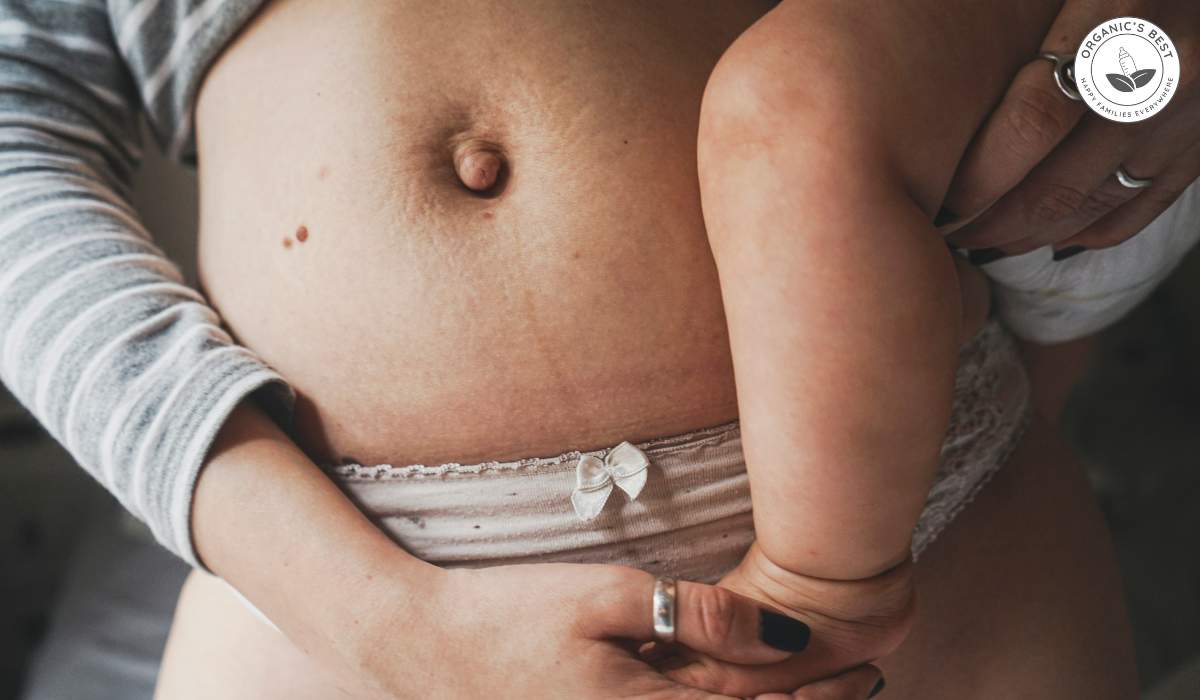Click to Get 2 FREE Boxes/Cans
Only New Customers! Click HERE to Get 2 Extra Boxes/Cans for Free With Your First Order.
BABY FORMULA
Offering new parents top-quality European infant formula from renowned brands like HiPP, Holle, Kendamil, and more. If you’re uncertain about which product to choose, our Formula Finder can help you make the best decision for your baby.
Baby Food
Offering new parents a premium selection of European baby foods, including jars, pouches, cereals, and snacks from esteemed brands like HiPP and Holle.
Postpartum Care: Key Recovery Tips for New Moms
by Agustina Fernandez August 26, 2025 9 min read

You did it! Your little bundle of joy has officially arrived, and your parenting journey is underway. The first few weeks will be full of learning and adjusting, but just as important as caring for your baby is caring for yourself, both physically and mentally.
Supporting your own recovery isn't only for your little one's benefit, but for yours too. After everything your body has gone through, and is still going through, you deserve to feel nurtured, supported, and healthy.
Recovery can look different for everyone, and the pressure to "bounce back" can be strong, so remember to listen to your own body and go at a pace that feels good for you. With that in mind, it helps to know some of the common postpartum milestones and general guidelines that can support your recovery.
In this article, we'll walk through what to expect, share practical recovery tips, and highlight when it might be time to reach out for extra support.
Table of Contents
- Understanding Postpartum: What is the Postpartum Period?
- Postpartum Physical Recovery After Birth
- Emotional & Mental Well-Being for New Moms
- Postpartum Nutrition for Faster Healing
- Sleep & Rest Strategies for New Mothers
- Breastfeeding and Newborn Care
- Postpartum Exercise & Fitness
- Body Image & Confidence After Childbirth
- Long-Term Postpartum Health & Self-Care
- When to Seek Medical Advice: Postnatal Warning Signs You Shouldn't Ignore
- Postpartum Essentials for Mom
- Final Thoughts: Prioritizing Your Well-Being as a New Mom
- Answering Your Questions on Postnatal Care
Understanding Postpartum: What is the Postpartum Period?

The postpartum period, sometimes called the fourth trimester, is the stretch of time right after birth, usually considered the first six to eight weeks, though in reality, recovery can take months.
During this time, your body is going through enormous physical and emotional shifts. Hormones are readjusting, your uterus is shrinking back to its pre-pregnancy size, and your organs are slowly returning to their usual positions.
The World Health Organization stresses how vital this period is, not only for babies but also for mothers. In fact, many pregnancy-related complications happen after birth, which is why paying attention to your well-being is so important.
Think of this time as a season of transition. You're adjusting to life with your baby, but you're also learning how to care for a new version of yourself and tend to your postpartum needs.
Fun fact: Your body produces the hormone relaxin during pregnancy, which loosens your ligaments and joints to prepare for birth. But relaxin doesn't disappear as soon as you give birth. It can hang around for months after delivery, which is why you might feel extra flexible, or wobbly, postpartum.
Postpartum Physical Recovery After Birth
Every birth is different, and so is every recovery. Whether you delivered vaginally or by cesarean, your body will need time and care to heal.
-
Vaginal delivery recovery: It's common to experience vaginal bleeding (lochia) for a few weeks. If you had any tearing during birth or an episiotomy, you may also feel soreness as stitches heal. Warm sitz baths and peri bottles can be small lifesavers here.
-
Cesarean recovery: A C-section is major abdominal surgery, so your body will need a longer postpartum healing time. You'll have an incision to care for and soreness around your core.
-
Other changes: Cramping (sometimes called "afterpains") happens as your uterus shrinks back down, and breast engorgement can make those early feeding days uncomfortable. It's also normal for your pelvic floor muscles to feel weaker, which can sometimes lead to urinary leaks. Gentle pelvic floor exercises (like Kegels) can help restore strength over time.
If at any point during this postpartum period you notice heavy bleeding, which involves soaking through a pad in under an hour, severe abdominal pain, fever, or signs of infection at your incision/tear, call your healthcare provider immediately.
Emotional & Mental Well-Being for New Moms
Here's the part that often doesn't get talked about enough, and that is the emotional side of postpartum care. You've just gone through one of the most life-changing events imaginable, and it's normal to feel all over the place emotionally.
Many new moms experience the baby blues, feelings of sadness, weepiness, or overwhelm that show up a few days after birth. This usually passes within two weeks. But if sadness lingers, feels heavy, or interferes with daily life, it may be postpartum depression, which deserves gentle but serious attention.
Studies suggest up to 1 in 5 new moms experience postpartum anxiety or depression in some form. You are not alone, and reaching out for help is a sign of strength, not weakness. Support can look like talking with a counsellor, joining a new moms' group, or simply letting a trusted friend know what you're feeling.

Postpartum Nutrition for Faster Healing
Food really does become medicine during postpartum recovery. Your body needs nutrients to rebuild, restore, and keep up with the demands of caring for a newborn. When it comes to your diet, make sure you focus on eating foods with the following components:
Iron helps replenish blood lost during delivery. Think leafy greens, beans, and lean meats.
Protein is crucial for tissue repair. Think eggs, fish, chicken, nuts, and dairy.
Fiber keeps digestion moving, which is extra important if you're dealing with postpartum constipation. Think fruits, veggies, legumes, nuts, and seeds.
Water is key to staying hydrated, which is especially important if you're breastfeeding. Keep a water bottle handy at all times.
Pro tip: You'll have your hands full with a newborn at home and less time for meal prep, so snacks you can eat with one hand are a lifesaver. Try foods like trail mix, cheese sticks, yogurt, or overnight oats.
Sleep & Rest Strategies for New Mothers
Ah, sleep, the elusive, magical unicorn of new parenthood. While you can't completely avoid sleepless nights during the postpartum period, there are a few ways to make rest more manageable.
-
Adjusting to sleep deprivation: Instead of waiting for a full night's sleep (which might not happen for a while), focus on catching rest in more frequent short stretches.
-
Creating a support system: If possible, take turns with your partner for night feeds. Even one longer stretch of sleep can feel miraculous.
-
Napping strategies: Don't feel guilty about napping during the day. Chores can wait; your health cannot.
Breastfeeding and Newborn Care
Breastfeeding can feel natural for some moms and challenging for others; it's truly different for everyone. Here are a few tips to help you get started, what difficulties you may encounter, and the benefits you'll enjoy!
-
Establishing a routine: The first few weeks are all about feeding on demand because your milk supply adjusts to your baby's needs.
-
Common challenges: Many moms encounter sore nipples, clogged ducts, or latching issues, but they can be managed with the help of a lactation consultant or other qualified healthcare professional.
-
Bonding: Whether you breastfeed or bottle-feed, feeding time is about connection. Eye contact, skin-to-skin, and gentle touch help build attachment.
And yes, if baby formula feels like the best option for your family, that's okay too. The best feeding method is the one that keeps both baby and mom thriving.
Some of the best formulas for newborns that we offer are HiPP Dutch Stage 1, which is an organic cow's milk formula enriched with prebiotics and probiotics, and Holle Cow Stage 1, which is made in the highest organic quality and features simple nourishing ingredients.
Postpartum Exercise & Fitness
Exercise might be the last thing on your mind right now, but incorporating gentle movement into your postpartum care plan can actually support healing and mood.
-
When to start: Most providers recommend waiting until your 6-week checkup before resuming structured exercise, but light walking and pelvic floor work can often begin earlier in the postpartum period.
-
Gentle workouts: Light activities such as walking, stretching, and core engagement exercises can be a great way to get movement in.
-
Core strength: Pregnancy shifts your abdominal muscles, sometimes leading to diastasis recti (ab separation). Postpartum-specific workouts can help heal your core safely.
Body Image & Confidence After Childbirth
Here's the truth: Your body has done something extraordinary, and it may not look or feel the same as before, and that's okay. It can be comforting to know what changes you might encounter and also how to feel good about this new version of yourself.
-
Adjusting to changes: Stretch marks, softer skin, or a c-section scar can feel strange at first.
-
Boosting confidence: Small things like showering, putting on a cozy outfit, or brushing your hair, can help you feel more like yourself.
-
Embracing identity: Remember, your worth isn't tied to how quickly you "bounce back." Postpartum self-care is a new chapter, not a rewind.
Long-Term Postpartum Health & Self-Care
It's important to be aware that recovery doesn't immediately end at six weeks. Many women notice ongoing shifts for months or even the first year after giving birth. Here are a few things to keep in mind on your postpartum care journey.
-
Hormone regulation: Your hormones may take time to stabilize, especially if you're breastfeeding.
-
Menstrual cycle return: Your period may come back within a few months or be delayed for over a year, depending on feeding and individual factors.
-
Self-care beyond the first year: Continue checking in with your mental health, physical healing, and support systems. Postpartum care is a marathon, not a sprint.
When to Seek Medical Advice: Postnatal Warning Signs You Shouldn't Ignore
It bears repeating that many health complications arise following birth, so it's important to be on the lookout for concerning symptoms that can be indicative of a serious issue.
Call your healthcare provider immediately if you experience:
-
Heavy vaginal bleeding: About 5% of women experience postpartum hemorrhage, which is an abnormal and dangerous amount of bleeding that can happen anywhere from 24 hours to 12 weeks after giving birth.
-
Severe abdominal or pelvic pain: Steady or intense pain in the abdominal or pelvic region can indicate a health problem such as postpartum endometritis or hemorrhaging, among other complications.
-
Fever or chills: If you experience an elevated body temperature or feel intensely cold in the first six weeks after birth, this could be a sign of a postpartum infection, a condition that requires medical treatment and which roughly 5-7% of women experience.
-
Redness or pus at an incision or tear site: These are classic symptoms of infection and should be treated immediately to avoid further health complications.
-
Severe sadness, hopelessness, or thoughts of harming yourself or your baby: These symptoms suggest a more severe presentation of postpartum depression and should be managed by a qualified healthcare professional.

Remember, you know yourself better than anyone, so always trust your instincts and if something feels off, get checked.
Postpartum Essentials for Mom
Just like your must-haves during pregnancy, you're bound to have a few postpartum care essentials. Anything that keeps you feeling comfortable, grounded, and content is worth having on hand.
Some items that can make postpartum care for mom more comfortable are:
-
Peri bottle and sitz bath supplies
-
Comfortable nursing bras or tanks
-
High-waisted leggings or loose clothing
-
Snacks and hydration on hand
-
A journal to process your thoughts and memories
Final Thoughts: Prioritizing Your Well-Being as a New Mom
Motherhood is a profound transition, and while your baby is precious, you are too. Caring for yourself is not selfish; it's essential. The postpartum period is a time to lean on support, give yourself grace, and take healing step by step.
Answering Your Questions on Postnatal Care
If you have a few lingering questions, here are a few answers to commonly asked questions.
How Long Does Postpartum Last?
Generally, the postpartum period is thought to last approximately 6-8 weeks after giving birth. Physically, many changes arise within six weeks, whereas emotional and hormonal recovery can take months, or even up to a year. Keep in mind that everyone will have a unique postpartum experience and that timelines vary between people and births.
What is the 5-5-5 Rule for Postpartum Care?
This gentle recovery guide suggests: 5 days in bed, 5 days on the bed, 5 days around the bed. The 5-5-5 postpartum guide is a recent trend intended to encourage rest and gradual return to activity during your first 15 days after giving birth.
While the 5-5-5 rule postpartum method is a great option for many moms, allowing them to slow down and settle into motherhood, it's not an option for everyone, as it requires the support of a partner or loved one to take on other responsibilities, which is a luxury not everyone has.
What Not to Do During Postpartum?
Your body has been through a lot, which is absolutely a testament to your strength. That being said, you want to be gentle to yourself after giving birth, so it's best to avoid things like heavy lifting, skipping meals, ignoring your own needs, downplaying mental health struggles, and not seeking support for postpartum depression. Remember, recovery thrives when you treat yourself with patience and care!
|
Disclaimer: Please be aware that this information is based on general trends in babies, and it is not medical advice. Your doctor should be your first source of information and advice when considering any changes to your child’s formula and when choosing your child’s formula. Always consult your pediatrician before making any decisions about your child’s diet or if you notice any changes in your child. Breastfeeding is the best nutrition for your baby because breast milk provides your child with all the essential nutrients they need for growth and development. Please consult your pediatrician if your child requires supplemental feeding. |
Agustina Fernandez
Dr. Agustina Fernandez earned her medical degree from the prestigious Universidad Nacional de Córdoba, Argentina. With a deep-rooted passion for pediatrics, Dr. Fernandez is currently on the path to specializing in children's healthcare. Recently, she has delved into the vital field of infant nutrition. Her research interests include breastfeeding, infant formula, and baby food in little ones’ formative years. Dr. Fernandez's commitment to this area of study underscores her dedication to ensuring the health and well-being of children from their earliest days.
Leave a comment
Comments will be approved before showing up.
Also in Organic Infant Nutrition and Health Blog

10 Winter Activities for Kids and Toddlers
by Agustina Fernandez January 06, 2026 8 min read
Read More
How to Choose The Best Infant Formula: A Guide to EU Organic Formulas
by Agustina Fernandez January 05, 2026 14 min read
Read More
Best Formula for Breastfed Babies 2026 Guide
by Agustina Fernandez January 05, 2026 15 min read
Read More